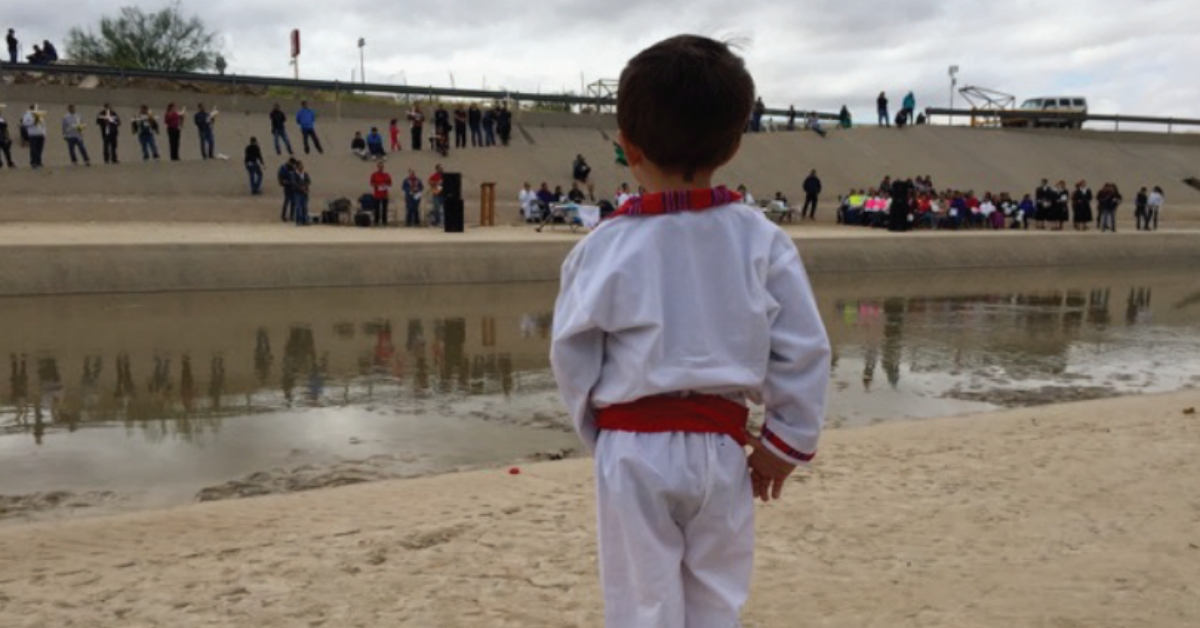
Child participates in the annual border mass (c: El Paso diocese)
Columban missionaries have been accompanying communities along the US/MX border for over 25 years. Every day we see how border communities are models of hospitality and creative cross-cultural encounter. We’re friends with the families that call this place home, who cherish their binational heritage.
We also see how inhumane immigration enforcement and extreme militarization sow fear and distrust in our communities. And for those that do not live here, conflicting media reports and demonizing rhetoric may be their only source of information about this beautiful place.
We invite you to come and see the reality beyond the rhetoric. By taking these nine steps, we hope you will gain a greater understanding of what is really going on at the border and how you can best advocate for border communities.
1. Pastoral Letters on the US/MX Border: Bishop Mark Seitz of the diocese of El Paso has written two pastoral letters on the reality of border communities: Sorrow and Mourning Flee Away and Night Will Be No More. We invite you to use these letters in your personal prayer, or to organize a prayer group and read through them together.
2. “A life unlike your own:” just as we pray with scripture, we can also pray with life’s experiences. Columban believe that God speaks to us through the experiences of others, particularly those who are marginalized or living in poverty, and that we should open our hearts to learn from those experiences. This includes migrants and border communities. Read this story of a mother separated from her child at the border, and then pray about it. What is God saying to you through this mother’s experiences? What does our Catholic tradition have to say about the injustice she and her child faced? (To learn more about this style of spirituality, read this reflection.)
3. Las Posadas Navideñas: this Latin American Christmastime tradition is a nine-day religious observance meant to honor Mary and Joseph’s search for safety. Every night from December 16 – 24, neighbors gather to recreate the Holy Family’s flight into Egypt, which deeply resonates with the experience of migrants and refugees today. Encourage your faith community to organize a posadas celebration this year. You can use this free guide to help your community commemorate the Holy Family’s journey.
4. The Root Causes of Migration: migrants arriving at the US/MX border are often fleeing crippling poverty, environmental destruction, extreme violence, political instability, and other serious threats to life. Learn more about the various push and pull factors, or root causes, that force people to migrate.
5. What a border resident thinks of border policies: with so much heated rhetoric and misinformation out there, it’s hard to have a clear picture about what’s really happening in US/MX border communities. That’s why we think it’s crucial to listen to the people who know it best: border residents.
6. What border policy should look like: the deterrence and enforcement-only strategies employed by the US government at the border are having chaotic and devastating impacts. So what does a just and compassionate border policy look like?
7. Visit the US/MX Border: the Columban Mission Center in El Paso, TX hosts “border awareness experiences” all year long. Consider organizing a trip for your parish or other local community.
8. Host a Border Justice workshop: this workshop explores the scriptural foundations and Catholic teaching on immigration and the reality of borders, the cultural and spiritual richness of border communities, and the federal policies that impact US/MX border communities.
9. Tell Congress to pass compassionate border funding: Write to your Members of Congress today urging them to provide meaningful humanitarian funding for the US/MX border.
*Editor's Note: Download our Border Solidarity Toolkit for a curated list of even more resources and activities that will help you learn more about US/MX border communities and how you can support them through prayer, education, and action.
Copyright © 2025 Columban Center for Advocacy and Outreach, Washington, D.C.